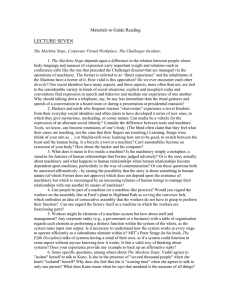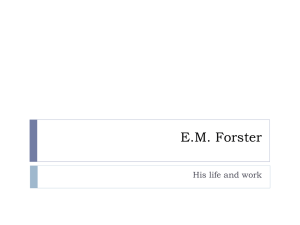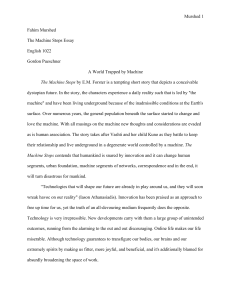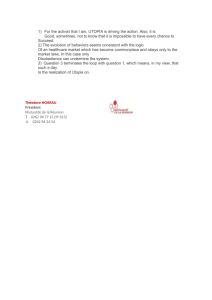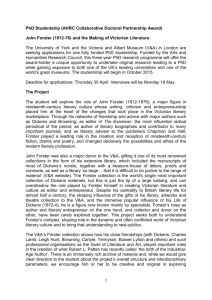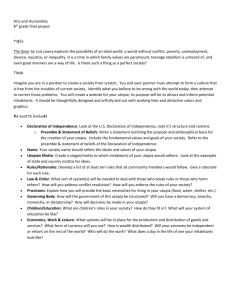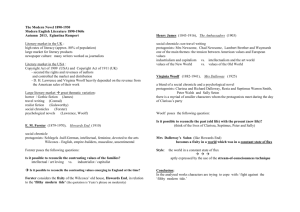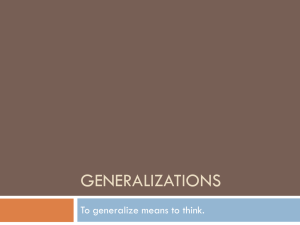FHS_Essay_1_Matt_Biggar - University of Southern California
advertisement
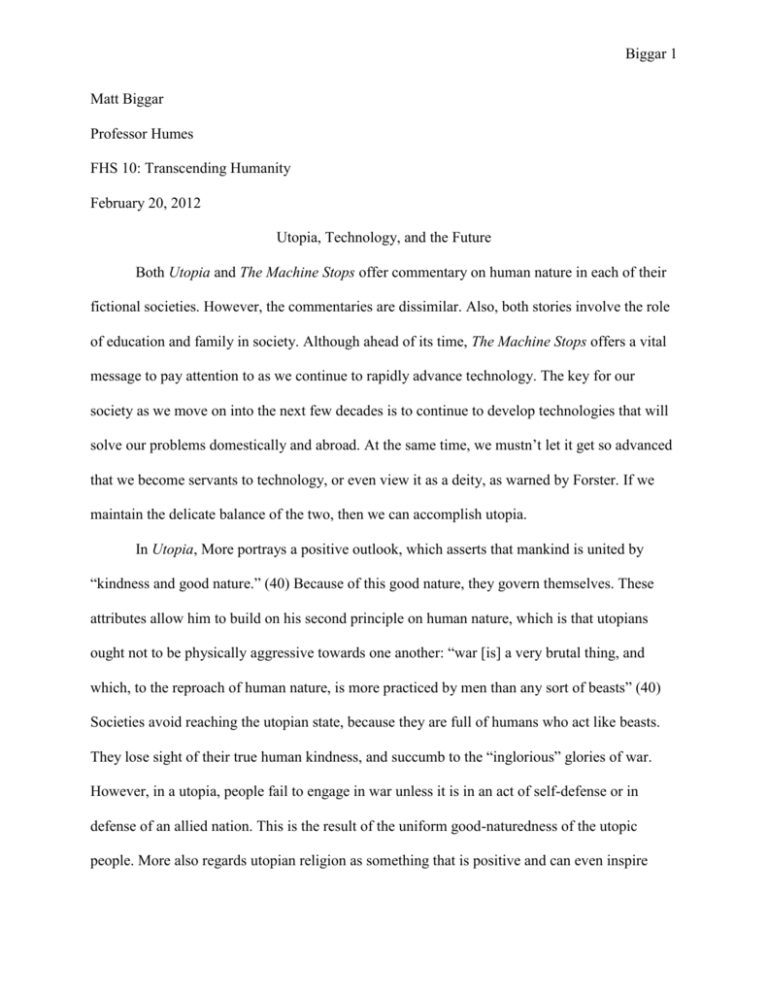
Biggar 1 Matt Biggar Professor Humes FHS 10: Transcending Humanity February 20, 2012 Utopia, Technology, and the Future Both Utopia and The Machine Stops offer commentary on human nature in each of their fictional societies. However, the commentaries are dissimilar. Also, both stories involve the role of education and family in society. Although ahead of its time, The Machine Stops offers a vital message to pay attention to as we continue to rapidly advance technology. The key for our society as we move on into the next few decades is to continue to develop technologies that will solve our problems domestically and abroad. At the same time, we mustn’t let it get so advanced that we become servants to technology, or even view it as a deity, as warned by Forster. If we maintain the delicate balance of the two, then we can accomplish utopia. In Utopia, More portrays a positive outlook, which asserts that mankind is united by “kindness and good nature.” (40) Because of this good nature, they govern themselves. These attributes allow him to build on his second principle on human nature, which is that utopians ought not to be physically aggressive towards one another: “war [is] a very brutal thing, and which, to the reproach of human nature, is more practiced by men than any sort of beasts” (40) Societies avoid reaching the utopian state, because they are full of humans who act like beasts. They lose sight of their true human kindness, and succumb to the “inglorious” glories of war. However, in a utopia, people fail to engage in war unless it is in an act of self-defense or in defense of an allied nation. This is the result of the uniform good-naturedness of the utopic people. More also regards utopian religion as something that is positive and can even inspire Biggar 2 people to serve the public. He explains, “some visit the sick; others mend highways, cleanse ditches, repair bridges, or dig turf, gravel or stone” (47). Religion allows the good nature of humans to shine as it causes them to act in the good of the community. There is also a strong sense of family in More’s story. Men are expected to live in the same household as their parents and grandparents. This is hardly the case in The Machine Stops. The underground people are isolated from birth: “Parents, duties of, said the book of the Machine, cease at the moment of birth.” (7) Forster’s story is unlike More’s. Forster paints a dystopia in which humans are not meant to rely on each other. Rather, they are expected to rely on the Machine. Their god-like technology forces humans to be isolated and antisocial. Utopia shows the equality of human nature through the banishment of slavery unless as punishment for the worst of crimes. However, all throughout The Machine Stops, The Central Committee puts down humans as servants of technology: “The Machine is omnipotent, eternal; blessed is the Machine.” (21) The ground dwellers are convinced that the Machine is their deity. Their culture has reached singularity; technology has superseded mankind. However, Forster writes The Machine not to praise this mindset. He comments, “Man, the flower of all flesh, the noblest of all creatures visible, man who had once made god in his image, and had mirrored his strength on the constellations, beautiful naked man was dying, strangled in the garments that he had woven.” (26) Forster explains that because mankind lost sight of its own beauty and God-given capabilities, we caused our own destruction. He paints human nature as a being as strong and withstanding as Orion’s Belt, but we unfortunately allowed technology to “strangle” us. Through the characterization of Kuno, he hopes we will learn from this fictional story and maintain our integrity as humans. Upon their impending death, Vashti pessimistically explains that humans are doomed to always be at the mercy of the Machine. Kuno retorts, “Never. Never. Humanity has learnt its lesson.” Biggar 3 (27) The protagonist offers hope that mankind will not repeat its mistake. We must not forget that we are the ones who created this technology and it must always be working for us. If not, our fate is inevitable; we will forever live enslaved in a dystopia. Although throughout the story Forster portrays humans as weak, isolated slaves, the overall message of The Machine Stops, however, is an empowering one for human nature. More stresses the importance of education to produce a utopia. He says education gives “additional vigour to their minds.” (43) Similarly, Forster believes humans must relentlessly pursue answers to life’s questions. For Kuno, he seeks to avoid the complacency of living underground, risking the “Homelessness” punishment. Forster warns against technology suppressing education. If it does, people will be so ignorant that they start to believe that stepping out into the sun will kill them. Kuno is an example for everyone to follow; education is the only way to see the world as it is, rather than how the Machine wants the cell dwellers to see it. In More’s time, technology was not seen as a potential catalyst for the fall of mankind. He failed to address technology’s role in utopian society. At that time, advances in technology were apparent mostly in warfare, but since utopians avoided war at all costs, the dangers of the weapons at the time were not addressed. Conversely, The Machine Stops was ahead of its time. Forster predicted the emergence of networks and the ability to converse via the Internet across continents. At the time, Americans were very skeptical about the changes brought about by technological advances. Now, with the potential emergence of singularity, Forster’s warnings against mankind’s dependence on technology are extremely relevant. Ray Kurweil predicts that technology will become so advanced in the next few decades that it will become smart enough to Biggar 4 advance itself, without any human influence. According to Forster, this needs to be avoided. We need to maintain firm control of technology and not allow it to rule over us. America will reach a utopian society in the 21st century if it solves its domestic and foreign problems with technology. We must develop universal information technology in order to educate all our citizens, rich or poor. Technology will play a vital role in America in the next 100 years to continue to educate its citizens. Also, we have to solve our immigration problem along the southern border. We cannot reach utopia if we have a rapidly growing population of unskilled and uneducated foreigners. Furthermore, we need to harness the sun’s rays and convert it into energy that we can use to replace coal and oil. That way, we would not have to meddle in the Middle East’s affairs and we can avoid wars. After all, America is comparable to More’s description of 16th-century Persia. A fortress of natural barriers protects us from invasions – the Atlantic Ocean to the east, the Pacific Ocean to the west. We are also governed by our own laws, which allow our people to be free to pursue happiness. What’s holding us back is the Utopian principles of not only avoiding wars unless in an act of self-defense, but also a religious commitment to public works. Americans need to avoid isolating themselves from the community like those in The Machine Stops do, and start valuing the community by donating their time to helping humanity. In the end, the advancement of technology is inevitable. Certain advances will help us move closer to a utopic state; but at the same time, we mustn’t lose sight that we are the ones who created technology. This will keep us thinking that we are smarter than it and not servants of it – as portrayed by Forster.
